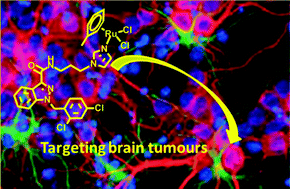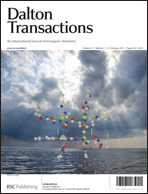Organometallic anticancer agents that interfere with cellular energy processes: a subtle approach to inducing cancer cell death†
Abstract
Two hybrid compounds comprising an antimetastatic ruthenium–arene fragment tethered to an indazole-3-carboxylic acid derivative that inhibits aerobic glycolysis in cancer cells have been prepared and evaluated in a variety of cancer cell lines, including highly relevant human glioblastoma cells, with an apparent synergistic action between the two components observed.


 Please wait while we load your content...
Please wait while we load your content...